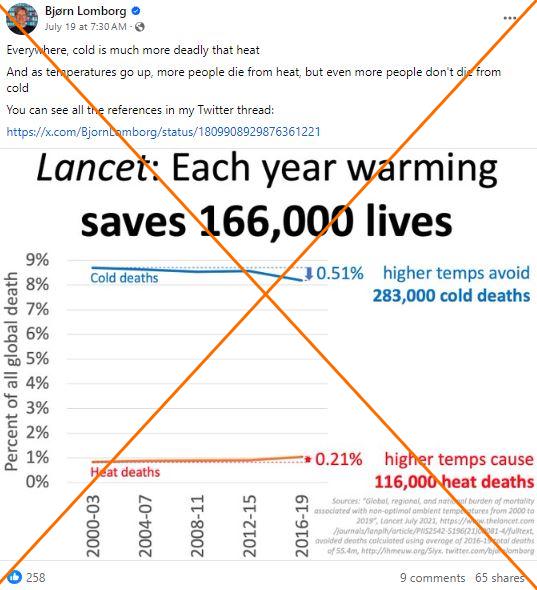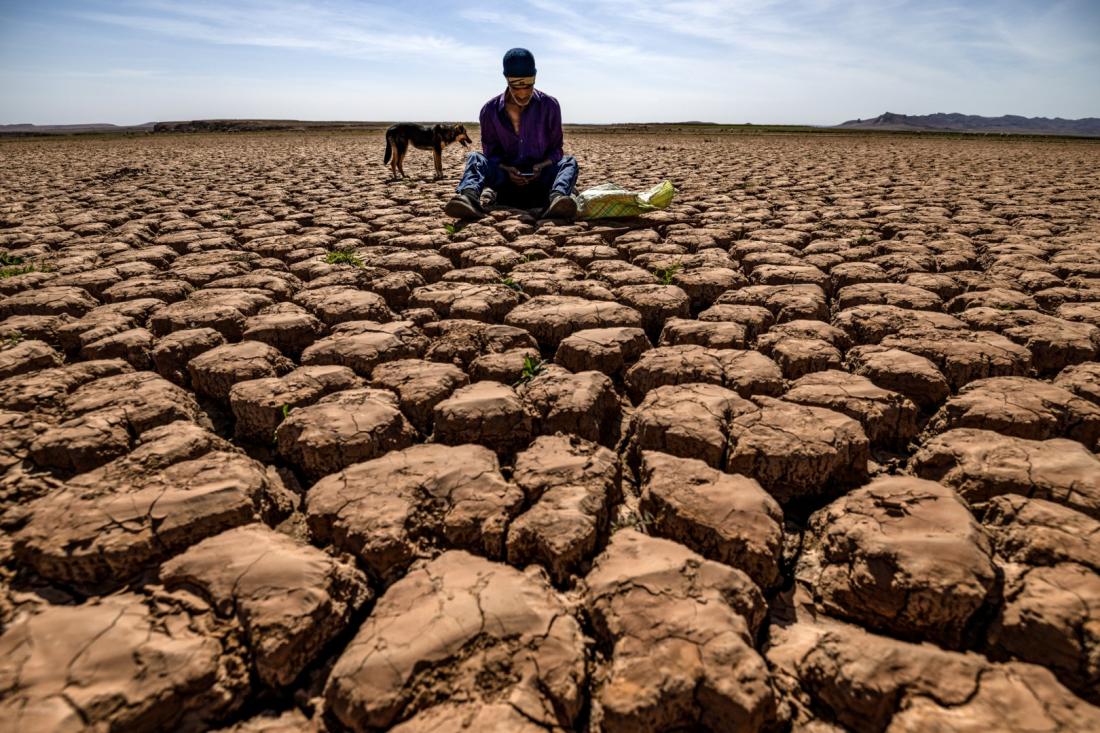
Posts downplay impact of climate extremes amid July heat records
- This article is more than one year old.
- Published on July 29, 2024 at 21:18
- 3 min read
- By Manon JACOB, AFP USA
"Lancet: Each year warming saves 166,000 lives," says a July 19, 2024 Facebook post by Danish statistician and author, Bjorn Lomborg, who published a book that argues the global alarm on human-induced climate change causes more harm than good (archived here and here).

The post is a variation of a claim previously debunked by AFP, based on a genuine study published in The Lancet in July 2021(archived here).
But climate experts, including an author of the study, said solely focusing on the premature deaths associated with exposure to extreme cold or heat ignores the longer-term effects of warming on climate extremes and, in turn, the deaths that derive from it.
"Clearly, Lomborg's conclusion that 'climate change saves lives' is biased," said Yuming Guo, who worked on the study (archived here).
"Climate change affects not only temperature-related mortality but also has other direct and indirect impacts," he told AFP on July 25, citing climate-sensitive factors such as floods, droughts and air pollution, all of which increase mortality risks in some populations (archived here).
"Obviously, climate change has serious impacts on human health," he said.
Net decrease
The study found there were 74 temperature-related excess deaths per 100,000 residents from the years 2000 to 2019 -- which at the time included the hottest decade since record keeping began (archived here).
Lomborg obtained the 166,000 figure based on the differences witnessed between cold-related deaths and heat-related deaths over that time period.
The study says global warming "might slightly reduce net temperature-related deaths in the short term, although, in the long run, climate change is expected to increase the mortality burden."
Guo said: "From 2000 to 2019, cold-related mortality decreased while heat-related mortality increased, resulting in a net decrease in total deaths."
But many factors contribute to excess deaths and "it is incorrect to attribute this net decrease solely to climate change," he said.
Lisa Alexander, climatology professor at the University of New South Wales in Australia (archived here), also said the social media posts mislead by focusing on one data point.
"In the short-term you might get a 'net saving' from global warming" but "the story is much more complicated than presented by one study" she said on July 24, 2024.
"Heat itself is usually confounded by other factors -- underlying health conditions, socio-economic status, age etc.," she added.
'Underreported everywhere'
Caradee Wright, chief specialist scientist at the South African Medical Research Council (archived here), previously told AFP that getting accurate data on heat-related health issues is difficult. "Heat deaths are grossly underreported everywhere," she said.
A heat stroke patient who goes to a hospital or clinic will likely be diagnosed with underlying conditions such as diabetes or breathing difficulties, Wright said, which may ultimately be cited as the cause of death.

"We don't have good data on mortality and morbidity from many low- and middle-income countries around the world where heat is a problem," she said.
Elfatih Eltahir, a professor at the MIT center for climate change (archived here), agreed that "the risk from climate and extreme temperatures vary significantly" and depend on many socio-economic factors.
"Different communities experience different levels of climate hazard and exhibit different levels of vulnerability," he told AFP on July 23.
In 2024, heatwaves have scorched much of the world, including Eastern European countries, Japan and North and Central America.
In Morocco, temperature extremes were recently reported to have killed at least 21 people in 24 hours.
AFP's fact-checks on false and misleading claims about climate change are available here.
Copyright © AFP 2017-2026. Any commercial use of this content requires a subscription. Click here to find out more.
Is there content that you would like AFP to fact-check? Get in touch.
Contact us




